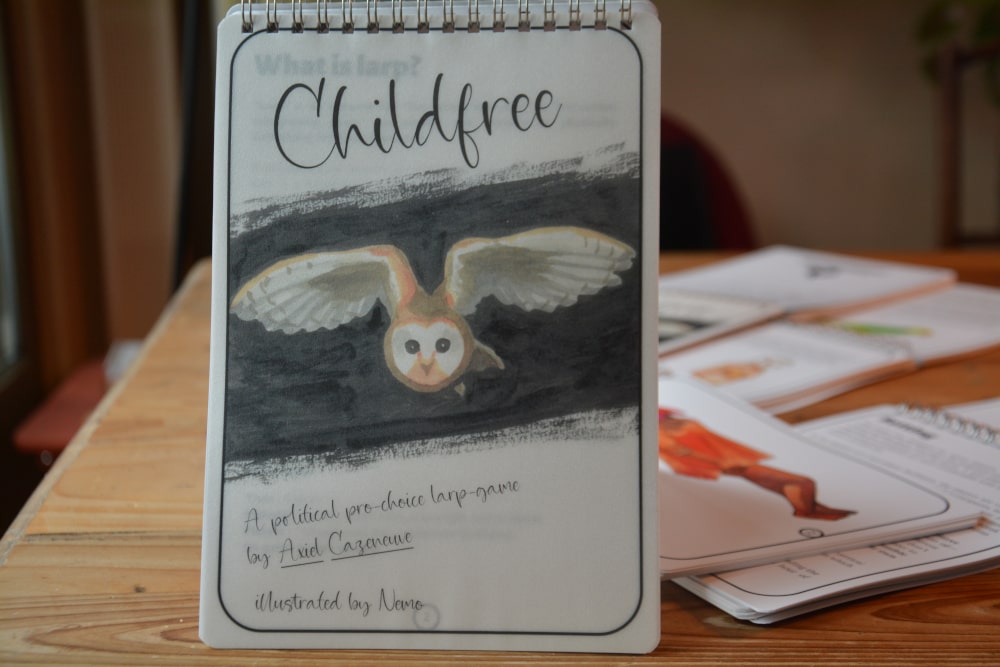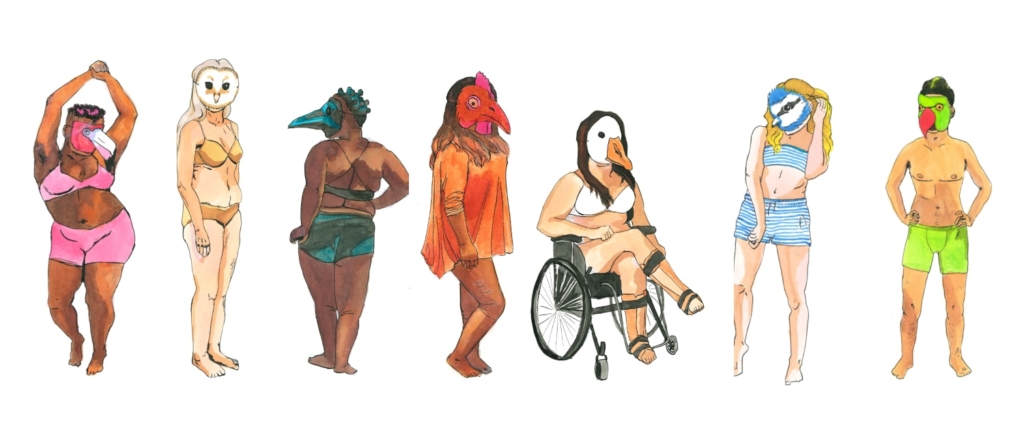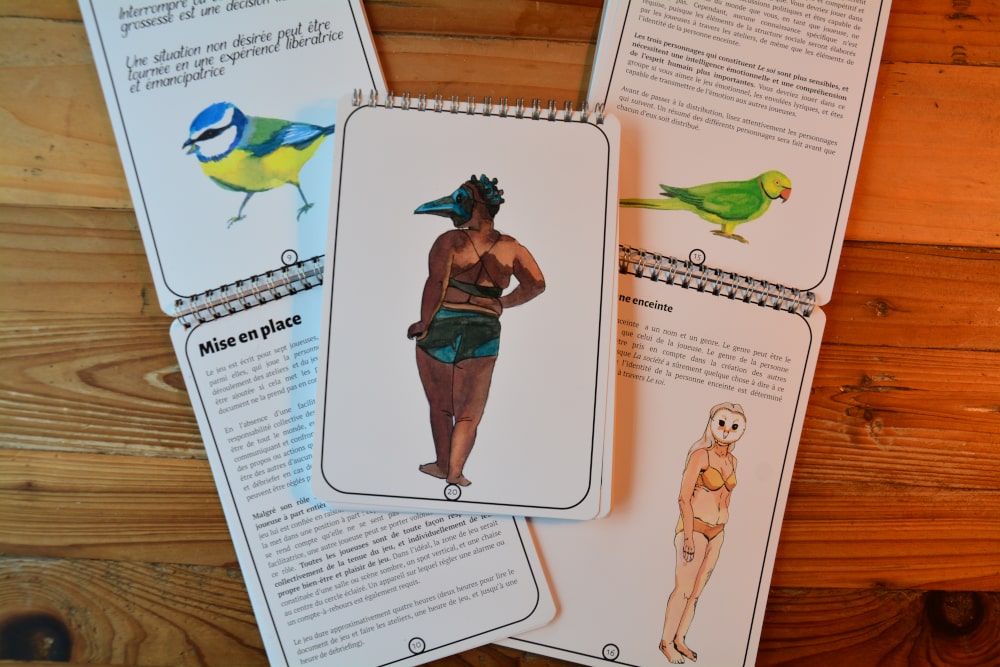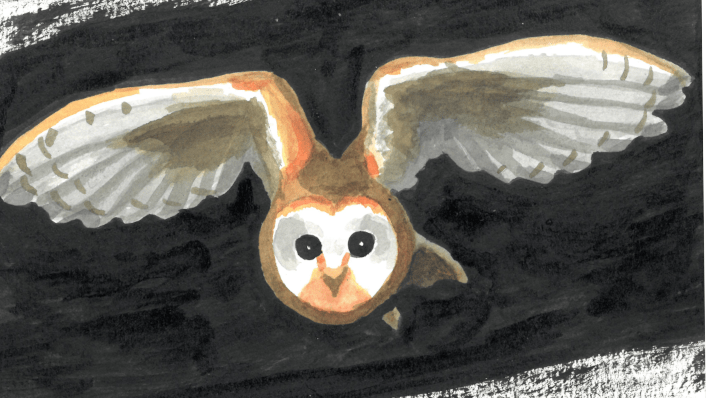It is with great pleasure that we present you with our edition of Axiel Cazeneuve’s role-playing game “childfree” at the beginning of the year 2023.
The ability to freely dispose of one’s body is still and always a battleground – and will probably remain so as long as individuals, institutions or nations arrogate power over others. With this re-edition we want to stand in solidarity with all those fighting for free access to abortion, whether it is challenging anti-abortion laws in Poland or developing computer security tools to protect pro-choice activists in Brazil.
Like all our other productions, Childfree can be ordered at free price and a PDF version is freely available on our website. Moreover, it will be available in most of our distribution points.
To help with the distribution-translation of this game, contact us at evasions@riseup.net
Childfree is a live-action role-playing game – the participants physically embody roles to tell a story together, in the absence of an audience – for 5 to 7 people, to be played in four hours all inclusive. It deals with abortion, or more precisely voluntary termination of pregnancy (VTP), by offering the players to embody on the one hand the social injunctions associated with pregnancy or abortion, and on the other hand the individuality of the pregnant person. The flexible and non-directive framework of the game enables the players to imagine and suggest various situations. The gender of the pregnant person, the details of their life, the legislative context… are entirely left to the people playing together, supported in this by the game documents, which are intended to be as clear and simple as possible. The decision to abort or continue the pregnancy is also, of course, left to the pregnant character (and thus to the person who plays them). By offering an experience that is entirely co-created by the participants, I wanted to share a bit of what undergoing a voluntary termination of pregnancy taught me, and the sense of liberation that came with it.
I wrote this game in 2018: on the occasion of the release of the edition by Projet Évasions, I propose to look back on my personal experience and on what motivated me to write.

An experience with voluntary termination of pregnancy in France in 2017
At the beginning of 2017, I was late with my period by a week. Since this was unusual, and I was also experiencing significant lower back and chest pain, I went to buy a pregnancy test. (On the way, I made a detour to the nearby store because I was craving some fruit jelly. As I watched the lone cardboard box being carried on the conveyor belt, I wondered if it was really worth taking the test).
Of course, the test came out positive. When I saw the two bars appear, I tried to cry. Um… No, that doesn’t work. I tried to laugh. Nope. So I picked up the phone – it was a Monday, I think, around noon – and called Planned Parenthood. Here’s the verbatim.
“Hello, I had an IUD inserted at yours nine months ago, I just took a pregnancy test and it’s positive.
Silence.
—Oh shit. Can you come in twenty minutes?”
I jumped in my car, which the partner who was with me drove, and within half an hour we were at the Planned Parenthood 31(the department’s number)office. A slew of tests and less than ten days later, I was having a medical abortion at home, surrounded by said partner and my roommates. As simple as that.
*
What this abortion taught me was that everything I had imagined, everything I had feared about becoming pregnant was wrong.
My worst nightmare was literally (I had actually dreamed about it, and to this day it remains one of the most realistic and terrifying dreams of my life) to experience a pregnancy denial. To realize too late that I was pregnant and not be able to abort. I was terrified of being forced to have a child. And yet, I was afraid of having to make the choice of abortion; afraid of not being able to do so, if a pregnancy did occur; afraid of feeling guilty, of suffering, of losing something. But when the moment actually came, I didn’t hesitate for a second. Not a second of doubt. Even my disgust and rejection towards gynecological exams faded away before this new imperative. “It” had to be done.
It was this disparity between my fantasized fears and my actual experience that was exemplified by my reaction to the test: I tried to have a strong emotion. I tried to cry because I expected to feel like crying. I tried to laugh because I thought I owed a strong reaction – an emotion, any emotion really, but an emotion. In that inaugural moment, I became aware of the weight that social representations and norms had placed on my shoulders since birth.

A feel-good larp to break out of the rhetorics of suffering
During that week, I started to write a live-action role-playing game (larp). It paralleled three couples, with contrasting compositions, desires and histories; in the waiting room of an obstetrics office, then with the doctor, then in various family interactions. The three couples consisted of two young straight people without children in an unwanted pregnancy, two straight forty-somethings in a blended family also facing unwanted pregnancy, and a gay, sapphic, and/or trans couple seeking MAP (depending on the casting, the genders of the characters varied as did the methods of MAP – made legal in the fictional game world). The larp, I think, was meant to highlight the disparity of experiences, judgments of others and family, individual feelings and importance of social relationships. In any case, once my abortion was over, so was the time to write, and I put the larp project aside (I tried to revive it fairly recently, but the angle didn’t work for me anymore, even though it had its qualities).
Almost two years later, however, I came across two larps on abortion that struck me by what they conveyed, obviously without even knowing it. Written by people I had no doubt were pro-choice, both games focused the experience – that of a heterosexual couple facing an unwanted pregnancy – on… “the possible futures” of “the child”.
I can’t even say I was upset about it. I was just floored. How can pro-abortion people center their discourse on the suffering generated by the interruption of a potential life? Shit, there’s really something culturally central to uproot.
In a Facebook comment under one of the posts that led me to these games, I swore that I would write a feel-good larp about abortion in response. Well; Childfree is not strictly speaking feel-good – it doesn’t specifically try to provoke positive emotions. Nevertheless, it is feel-free: and that’s probably even better, because what VTP was for me was first and foremost the experience of a liberation – of emancipation from the social norms that until then had unknowingly governed my representations.
It is this liberation that Childfree tries to bring you to experience.
Back to the material conditions of existence
I can’t leave you without a social comment. Obviously, if my experience was so positive, it is because I did not encounter any obstacle, I was accompanied adequately, efficiently and in a kind way by competent and available people with whom I could discuss openly and who did not make any judgment at any moment. If my experience was so positive, it is because I lived in a large French city, a stone’s throw from a Planned Parenthood office free of the influence of anti-abortionists. If my experience was so positive, it is because I was accompanied and supported by my friends – and to some extent my family – and I benefited from an environment where it was materially possible for me to have a drug induced abortion under good conditions. If my experience was so positive, it is because I was legally an adult and could travel independently, and because I was not working and my university was not scrutinizing absences so I didn’t need to get a leave of absence or talk to my employer or university. If my experience was so positive, it is because France was at that time the country in the world where access to abortion and other contraceptives was the easiest. It is probably still one of the best today, but that it remains so when entire departments are devoid of practitioners performing abortions says a lot about the state of the world and the global decline of reproductive rights.
Abortion as a means of contraception
It may surprise you that I classify abortion as a means of contraception, whereas it is generally set apart, presented as an almost isolated act, unlike any other. However, abortion is indeed part of contraception: it is a technique intended to control the fact of having (or not having) children, to allow a fertile person not to get pregnant. It is the last available contraception, the one we avoid having to use as much as possible, but its existence is absolutely crucial and is an integral part of the contraceptive process. Moreover, more than 70% of people who have resorted to abortion were using physical or hormonal contraception: this means that access to it in no way justifies opposition to abortion, because no contraception is 100% reliable and effective, even in the case of strict compliance (which, let’s not forget, is extremely complicated, and strangely enough only becomes a moral and guilt-inducing argument for “women” who take the pill, not for any person under treatment). And those who are opposed to abortion know it full well, since they are the same ones who want to limit access to contraception, for lack of culturally admissible arguments to remove it…

Leaving the debate on life or non-life
In addition, in order to understand how abortion fits into the continuum of contraception, it may be useful to know how to respond – if only to oneself, in order to deconstruct one’s representations – to the argument about the “life” of the embryo or fetus. Indeed, the terms of the debate are – as is often the case – imposed by conservatives: whether or not to legalize abortion, defining the maximum duration of pregnancy, controlling access to it… all of this revolves around the question “when does life begin?”, and we get caught in the trap of trying to answer it.
However, the answer to such a question can only be philosophical, even theological: no scientific answer is able to close the debate. The question is moral. The Violonist Argument substitutes another question: no longer “when does a life begin?” but “can one person be forced to preserve the life of another at their expense?”. The Violinist Argument is a thought experiment from a 1971 article by Judith Jarvis Thomson titled “A Defense of Abortion” in which she imagines a situation where the world’s best violinist, suffering from severe kidney failure, needs to be plugged into you for nine months to survive. Would you accept? and for nine years, would you still accept? Where would you draw the line? After all, the life of the best violinist in the world is at stake… This thought experiment invites us to move beyond the debate about whether or not the embryo, and then the fetus, is alive: the “life” (potential or actual) of the embryo or fetus is not relevant to the abortion debate. Whether or not it is a life is irrelevant: what we must wonder is “Can a person be forced to alienate their body and give up their life time for the benefit of another?” The answer is, of course, no. “[N]obody is morally required to make large sacrifices, of health, of all other interests and concerns, of all other duties and commitments, for nine years, or even for nine months, in order to keep another person alive.”
If you want to learn more about this experiment, here is the link to the article in English, or a great video from PhilosophyTube that puts the experiment on stage and anchors it in contemporary debates, fully subtitled in several languages.
play well,
Axiel Cazeneuve
